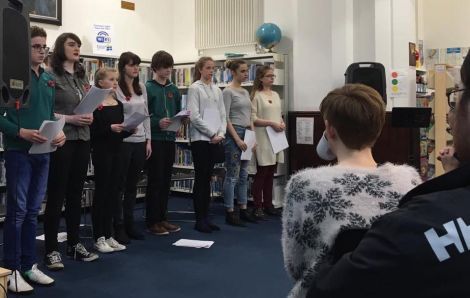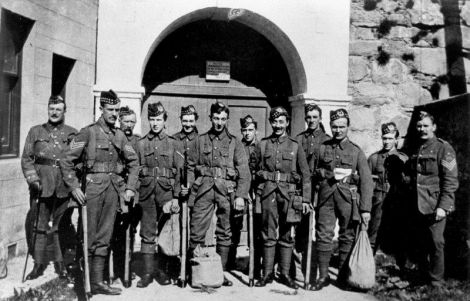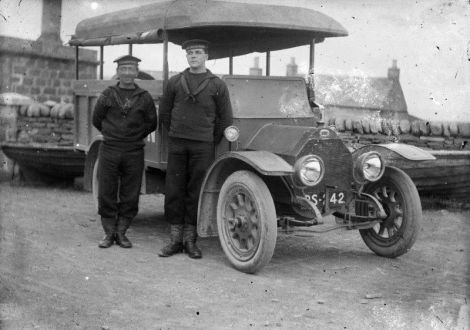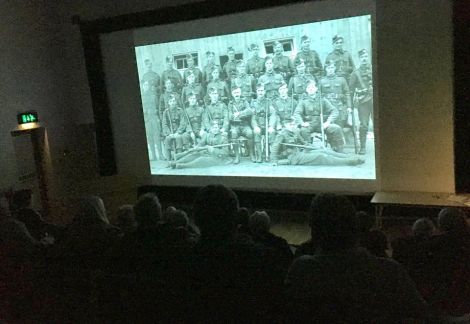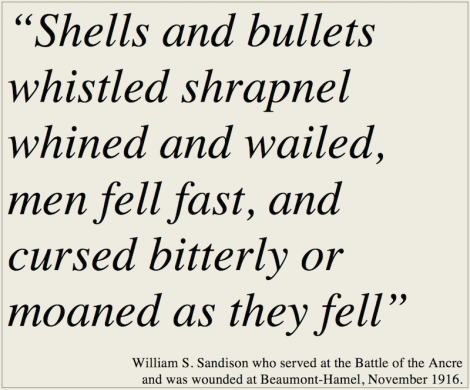Features / ‘Part of our past that needs to be kept alive’
A TRIO of important events commemorating World War One took place in Lerwick earlier this month. Laurie Goodlad went along and was struck by the meticulous dedication shown by local researchers into Shetland’s involvement in the catastrophic years of conflict.
Karen Fraser, collaborating with local volunteers and Shetland Museum & Archives, organised the programme, which coincides with wider national Remembrance Day events.
The series, marking Shetland’s contribution to the Great War (1914-18), was varied, informative and poignant. It forms part of a wider project, supported by the Scottish Government, aiming to engage more people with First World War history, increasing public awareness and encouraging the work of local researchers.
The first event, held in Shetland Library on Saturday 11 November, promised guests a “thoughtful, passionate and poignant evening of readings, theatre, poetry and music”.
Competing with several other major events, the library saw a good attendance regardless. Eight young people from John Haswell’s Shetland Youth Theatre gave two ten-minute performances based on poems from Jack Peterson. The performance was described as “flawless and confident”.
Ian Tait gave a reading from Capt. John Hoseason’s memoir of his time with the 10th Cruiser Squadron based in Shetland.
Angus Johnson read from the memoir of George Burgess about his time as a prisoner of war at the end of the conflict and his experiences witnessing the collapse of the German army. Burgess was captured in April 1918 and held in a camp in Belgium. He later served as Provost of Lerwick during the 1950s.
Mark Sandison read an extract from Robert Grieg’s book Doing His Bit. Grieg, who was a journalist for The Shetland Times, wrote about his own personal experiences on the Western Front, giving a chilling first-hand account of the realities facing those on the front line.
Become a member of Shetland News
Marsali Taylor read a letter by Shetland nurse Martha Aitken from Safely Wounded – Shetland Letters from the First World War.
Poetry was offered by Christian Tait and Laureen Johnson. Christian read a series of poems from her book Stones on the Millpond, which was based on her family’s war letters.
Laureen Johnson read her poem Visiting Sweden, a thought-provoking reflection on the differences she felt in a country that stayed out of our two great wars.
Erin Keenan offered two songs which she performed very well: an English translation of a French soldier’s song, and a heartbreaking rendition of the 1914 patriotic song Keep the Home Fires Burning. Her performances stunned the audience.
The second in the series of talks and events, held at the museum on Monday night (13 Nov), featured a short film, compiled by J. J. Jamieson (see above).
This was followed by Jon Sandison who gave a lecture on the Battle of the Ancre. The film, narrated by Matthew Simpson, detailed the story of Private Andrew Williamson.
Describing how the film was made, Jon said that “Private Williamson, as depicted through the film, was not an actual Shetland Territorial. J.J. and myself looked at all of the names of those who served, and decided upon a common first name, and a common Shetland second name, and went with this name depiction.
“I guess, in a poignant sort of way, the imaginary name of Andrew Williamson was a representation of all of the men’s story”.
The Battle of the Ancre, “Shetland’s darkest day”, saw heavy losses for the local territorials, and achieved mixed success in its objectives. It was part of the Somme offensive, which began in the summer of 1916 and was concluded with the Battle of the Ancre 101 years ago to the day.
Jon explained how, on a day of thick fog, “the 51st Highland Division, of which Shetlanders played a significant part, famously took Beaumont Hamel. However, to the north at Serre where other Shetlanders were, only a German front line trench was taken”.
The lecture, told individual stories of serving Shetlanders who both lived and died during the offensive, which aimed to gain ground from the Germans. One of the first photographs shown was the Belmont Cable Guard, ten men, seated and proud. By the end of the lecture it transpired that four of these men had been killed, and another wounded – a mortality rate of almost 50 per cent.
Although remembering the 21 young Shetland men who lost their lives, the lecture ended with the story of Jim Houston, who did come home.
The importance of remembering those who survived, with lives changed, was also stressed, as so often the focus remains on those who didn’t. Another striking aspect of the evening was the passion, respect and sincerity which came through.
A tough balance to strike when delivering an academic lecture, but one which Jon unquestionably achieved. The dedication he applied to researching these men’s stories is incredible. His parting thought was that he hoped someone else would be standing where he was 100 years from now, speaking passionately about the Ancre.
On Wednesday afternoon, Marsali delivered a lecture to a full house in the Old Library Centre. She discussed women on the front line and her new book, Forgotten Heroines: The diaries of Ysabel Birkbeck, Ambulance driver on the Romanian Front, 1916-17.
These diaries offer a unique insight into life on the Romanian front line and also offer the reader a female perspective on war. It should be remembered that many thousands of women contributed to the war effort, supporting the men and often placing themselves in great danger in the process.
This project hopes to encourage more publications, with three books already in the pipeline:
- The story of the Abernethy brothers, based on an original war diary. This book, by Graham Johnston, will also look into the history of gas warfare.
- A book by Jon Sandison describing perhaps the darkest day of Shetland’s war – 13 November 1916 – when over 20 Shetlanders lost their lives in one battle.
- A work on Shetland mariners by Laughton Johnston, which will tie in with an exhibition at the museum next year.
These events demonstrate the wealth of knowledge and the important contribution that those researching the stories can make to our knowledge of the past and Shetland’s place in the history books.
Speaking after his lecture, Jon said: “With regard to the Ancre more widely, this battle and the impact of it upon our community should never be forgotten”. At a time when communities were much closer, the effects must have been massive.
Looking beyond the centenary years, he emphasises the importance of remembrance as “this battle (Ancre) is a crucial part of our local heritage story, as is the land and ground upon which these men fought in France.
“As Shetlanders, this part of our past needs to be kept alive so that our future generations don’t forget about it,” Jon added. “It was the first time during the First World War when our islands experienced large casualties on the Western Front within a short space of time.”
Lest We Forget.
Become a member of Shetland News
Shetland News is asking its readers to consider paying for membership to get additional perks:
- Removal of third-party ads;
- Bookmark posts to read later;
- Exclusive curated weekly newsletter;
- Hide membership messages;
- Comments open for discussion.
If you appreciate what we do and feel strongly about impartial local journalism, then please become a member of Shetland News by either making a single payment, or setting up a monthly, quarterly or yearly subscription.




